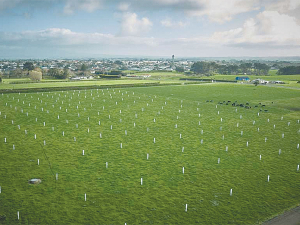Fonterra’s exit from Australia ‘a major event’
Fonterra’s impending exit from the Australian dairy industry is a major event but the story doesn’t change too much for farmers.
 Native trees, Kapuka and Kanuka, have been planted in 12m or 16m spacings to test two different densities and learn about silvopasture, the practice of integrating trees with grazing animals.
Native trees, Kapuka and Kanuka, have been planted in 12m or 16m spacings to test two different densities and learn about silvopasture, the practice of integrating trees with grazing animals.
A net zero pilot dairy farm, set up in Taranaki two years ago to help reduce on-farm emissions, is showing promising results.
The farm is owned by Fonterra and is located next to its Whareroa plant. With one of its biggest global customers, Nestle, Fonterra aims to create New Zealand's first commercially viable net zero dairy farm within ten years. The farm is run with Dairy Trust Taranaki.
Since 2022, the Fonterra-owned 290ha farm has achieved an approximate 27% reduction in absolute emissions and a 5.5% reduction in emissions intensity.
Fonterra director of sustainability Charlotte Rutherford says the reduction is promising, though results may vary seasonally.
"We're pleased with our progress so far but still have a lot more work to do to make further improvements.
"We are trialling different tools and approaches to see what works and what doesn't, and while some trials have shown promising early results, others have provided valuable insights and lessons."
The reduction in absolute emissions over the last two seasons was coupled with a decrease in milk production.
Over this time, the herd decreased from 600 to 550 cows and was switched to ten milkings across seven days rather than two milkings a day. This improved staff morale and reduced farm operating expenses, but resulted in an 11-12% decrease in milksolids production per cow. The farm has returned to twice a day miking this season.
The focus over the next three seasons is to reduce emissions intensity, targeting a 30% reduction by the 2026-27 season. This will be achieved through a focus on breeding and reproduction, calf-rearing, nitrogen use efficiency and the use of novel technology.
Over the last two seasons, the farm has used crossbred sexed semen on the top 60% of cows, based on their genetic merit, which has led to significant genetic gains, although challenges in conception rates remain.
The trial of novel technology EcoPond has shown promising results reducing methane emissions from the effluent by 93% since its installation in May. The EcoPond team are currently developing a method to treat the whole pond.
Other novel technology includes the use of a milk cooling system via New Zealand-owned Coolsense, which is expected to reduce dairy shed power consumption by up to 30%.
Native trees, Kapuka and Kanuka, have been planted in 12m or 16m spacings to test two different densities and learn about silvopasture, the practice of integrating trees with grazing animals.
The trees will grow to 10-15m in height, with the aim to balance the carbon, shade and shelter benefits and minimise negative effects on pasture growth.
In addition to the farm, Nestle is partnering with Fonterra to provide direct support to farmers to help them reach the co-operative's target of a 30% reduction in on farm emissions intensity by 2030, from a 2018 baseline.
It includes Nestle funding an extra payment for farmers who achieved The Co-operative Difference for the 2023-24 season, which was in the vicinity of 1.44c/kgMS. This payment to Fonterra farmers who achieve The Co-operative Difference will be offered again for the 2024-25 season.
Nestle New Zealand chief executive Jennifer Chappell says the initial results are promising.
Fonterra board members and management visited the farm before the co-op's annual general meeting in New Plymouth this month.
Fonterra’s impending exit from the Australian dairy industry is a major event but the story doesn’t change too much for farmers.
Expect greater collaboration between Massey University’s school of Agriculture and Environment and Ireland’s leading agriculture university, the University College of Dublin (UCD), in the future.
A partnership between Torere Macadamias Ltd and the Riddet Institute aims to unlock value from macadamia nuts while growing the next generation of Māori agribusiness researchers.
A new partnership between Dairy Women’s Network (DWN) and NZAgbiz aims to make evidence-based calf rearing practices accessible to all farm teams.
Despite some trying circumstances recently, the cherry season looks set to emerge on top of things.
Changed logos on shirts otherwise it will be business as usual when Fonterra’s consumer and related businesses are expected to change hands next month.
OPINION: Fonterra may be on the verge of selling its consumer business in New Zealand, but the co-operative is not…
OPINION: What does the birth rate in China have to do with stock trading? Just ask a2 Milk Company.